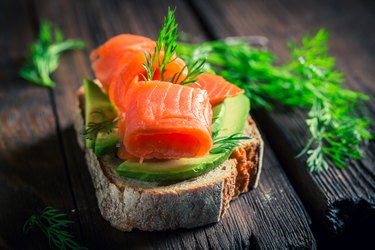
When it comes to avoiding getting sick, we know the drill: Wash your hands often, get the flu shot, don't touch your face, get your zzzs. But what you eat also plays a role in keeping your immune system up to snuff, and in a number of ways.
Vitamins A, C, E and D, iron and zinc are all involved in immune function, so eating foods rich in these nutrients is vital. And what we eat can increase or decrease inflammation in our bodies. Foods such as refined grains, sugary drinks, fried foods and red meat can increase inflammation while fruit, vegetables, olive oil, nuts and fatty fish can actually decrease it, per Harvard Health Publishing.
Video of the Day
Video of the Day
If we're enjoying soda and fries on the regular, our bodies will likely be in a state of chronic inflammation. When this happens, our cortisol levels increase and remain high, which suppresses our immune system, per Today's Dietitian. Swapping these out for anti-inflammatory foods can help.
And processed foods often contain a lot of sodium, which doesn't spell good news for our immunity. Researchers found an association between a high-salt diet and immune deficiencies, per a March 2020 study in Science Translational Medicine. Eating too much salt can impair neutrophils' (white blood cells) ability to kill bacteria in the body.
Lastly, what we put in our mouth eventually makes its way to our gut, and some foods can help or hurt the bacteria we have living there, according to a February 2019 study in Gut. Foods like fiber, prebiotics and probiotics are good for our gut while a high-fat diet may be harmful.
Now that we know some of the ways diet plays a role in helping keep us healthy, here are five immune-supporting swaps for some common immune-busting foods.
Related Reading
1. Instead of Potato Chips, Try Popcorn

Whole potatoes are actually good for you: They help increase our overall potassium and fiber intake, two nutrients we are not getting enough of.
But potato chips, not so much. Potato chips are fried and they're missing the outer skin that contains the fiber. Popcorn is a much more nutritious snack that still delivers on crunch. It's a whole grain and a source of polyphenols. And, the popping process doesn't significantly degrade the antioxidant content in popcorn, and our bodies are able to absorb those antioxidants, according to a January 2019 study in Antioxidants.
When shopping for popcorn, look for bags of already popped popcorn or kernels that you can pop at home. Also, look for a simple ingredient list: popping corn, salt, butter and/or a high-quality oil like olive oil or avocado oil — avoid less nutritious oils like palm oil.
Brands We Love
- Pipcorn Mini Popcorn ($14.99 per 3-pack on Amazon.com)
- Angie’s Boom Chicka Pop Sea Salt Popcorn ($8.92 per 4-pack on Amazon.com)
- Arrowhead Mills Organic White Popcorn ($39.99 per 6-pack on Amazon.com)
2. Instead of Soda, Go for Kombucha

Soda is high in added sugar, which we know is an inflammatory food, but it can also have copious amounts of caffeine depending on your drink of choice.
Caffeine can screw with your sleep if you're drinking too much — the Food and Drug Administration (FDA) recommends limiting it to 400 milligrams per day for most adults — or if you're drinking it too late in the day.
Instead, try kombucha. It still has some sweetness to it along with the bubbles, but it also packs probiotics, which support your gut health.
Brands We Love
- GT’s Kombucha ($3.49 per bottle on Amazon.com)
- Health-Ade Kombucha ($2.70 per bottle on Amazon.com)
3. Instead of White Bread, Reach for Whole-Grain Bread
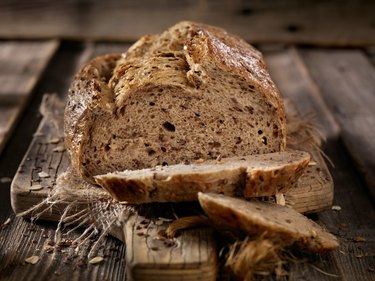
White bread was once whole-grain bread that underwent a few more steps of processing.
The extra processing includes removing the nutritious bran and germ (two of the three parts that make up a grain) and leaving the endosperm, which contains most of the carbs, some protein and minimal vitamins and minerals.
It's this processing that makes white bread a "refined" grain and what keeps whole grains, whole. Whole wheat is higher in immune-supporting nutrients like vitamins E, fiber and iron compared to refined wheat, according to the Whole Grains Council.
Brands We Love
- Dave's Killer Bread, 21 Whole Grains and Seeds ($6.39 per loaf on Amazon.com)
- Food for Life Sprouted Grain Bread ($6.69 per loaf on Amazon.com)
4. Instead of Steak, Opt for Salmon
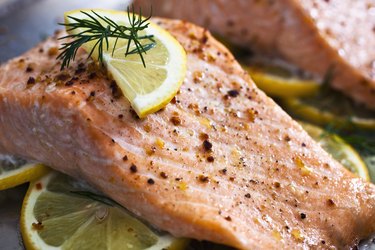
Red meat is associated with higher levels of inflammation. Observational studies (which show an association rather than a cause-and-effect relationship) such as this February 2013 study in the European Journal of Nutrition found a link between eating red meat and increased CRP levels, an inflammation marker in the body.
Salmon, on the other hand, is high in omega-3 fatty acids, which help reduce inflammation in the body, according to the Cleveland Clinic. Rather than serving up a steak or burger for dinner, switch to salmon twice a week.
Tip
Go for wild salmon over farmed when you can. Farmed salmon has more calories and saturated fat than its wild counterparts, per the Cleveland Clinic.
5. Instead of a Salty Snack Mix, Nosh on Pistachios
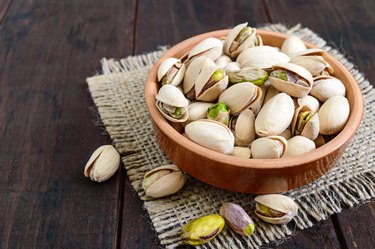
There's nothing redeeming about snack mix, and we're not even talking about what's served at the local hole-in-the-wall. (That, for sure, will not do your immune system any favors.)
But the ready-made snack mix you find in the snack aisle made up of mini pretzels, small fried pieces of bread and salty little pieces of cereal and/or nuts is high in sodium, saturated fat and refined carbs.
Instead, keep it simple and go for pistachios. They're a good source of healthy fats, fiber and some iron — and the polyphenols inside the nut help to fight inflammation, according to an August 2017 study in Nutrients.
Brands We Love
- Wonderful Pistachios Roasted & Lightly Salted ($7.64 per 16-ounce bag on Amazon.com)
- 365 Everyday Value Roasted and Salted Pistachios ($11.99 per 24-ounce bag on Amazon.com)
Click below to pin and save these healthy swaps for later!
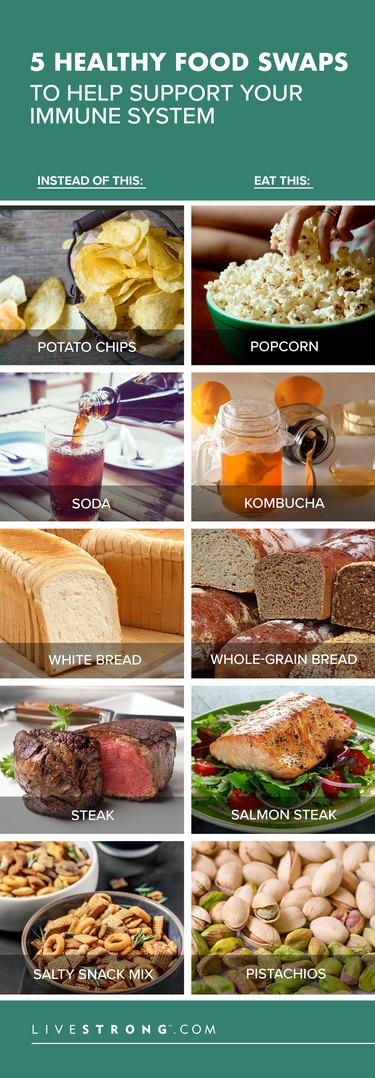
- Harvard Health: "Foods That Fight Inflammation"
- Today's Dietitian: "Cortisol — Its Role in Stress, Inflammation, and Indications for Diet Therapy"
- Gut: "Effects of Dietary Fat on Gut Microbiota and Faecal Metabolites, and Their Relationship with Cardiometabolic Risk Factors: A 6-month Randomised Controlled-Feeding Trial"
- British Journal of Nutrition: "Daily Intake of Non-Fried Potato Does Not Affect Markers of Glycemia and is Associated with Better Diet Quality Compared to Refined Grains: A Randomized, Crossover Study in Healthy Adults"
- 2015-2020 Dietary Guidelines for Americans: "Shifts Needed To Align With Healthy Eating Patterns"
- Antioxidants: "Analysis of Popcorn (Zea Mays L. var. Everta) for Antioxidant Capacity and Total Phenolic Content"
- Food and Drug Administration: "Spilling the Beans: How Much Caffeine is Too Much?"
- Whole Grains Council: "What's a Whole Grain? A Refined Grain?"
- European Journal of Nutrition: "Consumption of Red Meat and Whole-Grain Bread in Relation to Biomarkers of Obesity, Inflammation, Glucose Metabolism and Oxidative Stress"
- Cleveland Clinic: "Omega-3 Fatty Acids"
- Nutrients: "The Anti-Inflammatory and Antioxidant Potential of Pistachios (Pistacia vera L.) In Vitro and In Vivo"
- Cleveland Clinic: "Fish Faceoff: Wild Salmon vs. Farmed Salmon"
- Science Translational Medicine: "A high-salt diet compromises antibacterial neutrophil responses through hormonal perturbation"